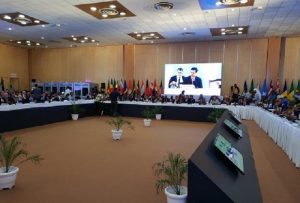The International Solar Alliance establishes the rules of the game

The first general assembly of the International Solar Alliance at Greater Noida, near New Delhi, on October 3 (Image: ISA Secretariat)
A day after India’s Prime Minister Narendra Modi gave the mantra “One World, One Sun, One Grid”, calling the world to connect on the common goal of harnessing solar power during the launch of big global events on renewable energy, 121 sunshine-rich countries came under one roof in what was the International Solar Alliance’s maiden general assembly.
International Solar Alliance (ISA) is a treaty-based intergovernmental organisation of countries that lie between the Tropic of Cancer and Tropic of Capricorn, a region that gets the maximum sunshine, to realise the full potential of solar and bring affordable power to the poor who are still grappling with electricity access.
In the first day of the October 3-5 assembly in Greater Noida next to New Delhi, ISA launched its fifth programme – scaling up solar e-mobility and storage – to promote, assess potential and aggregate demand for rapid deployment of solarised vehicles and associated storage infrastructure in urban and rural areas.
In accordance with the goals of 2015 Paris declaration during the launch of ISA, the programme will aim to transform the transport sector in 121 countries that currently contributes to 23% of carbon emissions, as per the estimates by the International Energy Agency.
Earlier, ISA had launched a series of four programmes to achieve its target of installing 1,000 GW of solar power and mobilising USD 1 trillion to achieve the goal by 2030. These four programmes that are pillars of ISA’s vision look at scaling solar applications for agricultural use, scaling up affordable financing for solar, mini-grids and rooftop solar.
Forty four countries that had ratified ISA’s framework participated as members with voting rights in the assembly while those who had signed the treaty but not ratified it participated as observers.
On the first day, the assembly chose R.K. Singh, India’s minister for power and for new and renewable energy, as its president and Brune Poirson, secretary of state to the Minister for the Ecological and Inclusive Transition, France, as the co-president.
“This is a historic occasion because it is the first assembly of an intergovernmental body which we believe has a seminal and important role to play in ensuring sustainability of our planet and development goals. There are great expectations from us and we have to translate vision of International Solar Alliance into action,” said Singh while addressing the assembly.
Poirson talked about key things to focus on to move ahead on the path of attaining clean energy. “We need viable projects. We need a roadmap with clear objectives and investment needs. We need to strengthen capacity,” he said.
Finance is a big challenge for ISA to achieve its ambitious target. Poirson said, “France has committed one billion euro to develop solar. Out of this 80 million euro are earmarked for 23 countries as investment for 34 projects.”
The alliance also attracted investments from governments, companies and other organisations taking the corpus amount of ISA to USD 27 million. Coal India and India Trade Promotion Organisation presented cheques during the assembly.
The ISA also got its first director general as well – Upendra Tripathy, who has been working as the interim director general.
The provision of membership was also extended to countries that fall outside the tropical region but have shown a desire to be part of the global solar movement. The assembly granted membership to Spain, Tajikistan, Italy and Tunisia. They can now participate as observers.
ISA also signed a memorandum of understanding with the Indian Ocean Rim Association (IORA) to strengthen cooperation in trade and facilitate investment.
The general assembly of ISA is being held along with two other global meetings on renewable energy – the second edition of RE-invest and a meeting of energy ministers of the 21 IORA countries, and an overlap with ISA member countries.
RE-Invest
One of the major issues being dealt with at the concurrent renewable energy investment conference RE-Invest is the cost of finance being faced by RE project developers. It is now largely accepted that the amount of money needed for a shift to a greener economy can come only from private and institutional investors such as insurance funds. Governments and multilateral institutions such as the International Finance Corporation are now examining how they can get the interest rates reduced for developers, by standing as guarantors for the loans the developers need.
Speaking on the eve of RE-Invest, Arunabha Ghosh, CEO of the think tank Council on Energy, Environment and Water (CEEW), said, “An RE ecosystem commensurate with India’s ambitions demands innovations in manufacturing, finance, business models, and technologies. India’s RE revolution is dynamic but incipient. RE-Invest 2018 is an opportunity for India to reaffirm its commitments to renewable energy targets, contract sanctity, reducing losses, and encouraging innovation. India can become the largest clean energy market in the world to operate on market-friendly principles, and this platform is an opportunity to showcase that potential to the world.”
Kanika Chawla, Senior Programme Lead at CEEW, said, “In the three and a half years since the last RE-Invest, the renewable energy market has grown rapidly. The advances made have set India on firm footing for an energy transition rooted in domestic priorities, and honouring international commitments. The 2018 RE-Invest will demonstrate India’s climate leadership through its continued action on scaling up renewable energy solutions at home, as well as supporting the energy transition in developing economies around the world through the International Solar Alliance. The narrative has shifted. RE-Invest 2018 will not be a debate on the value proposition of renewables, but rather a deep deliberation on the means to surge ahead in a timely and efficient manner, and this is the proof of the value proposition of renewable energy.”
